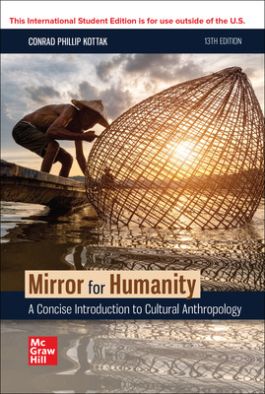Mirror for Humanity ISE
13th Edition
1265183139
·
9781265183134
© 2023 | Published: January 21, 2022
Mirror for Humanity is a brief introduction to sociocultural anthropology, also covering linguistic and applied anthropology. Its shorter length increases the instructor’s options for assigning additional reading—case studies, readers, and othe…
Read More
Request Review Access
Receive via shipping:
- Colour, print bound version of the complete text
Chapter 1 - What Is Anthropology?
Chapter 2 - Culture
Chapter 3 - Doing Anthropology
Chapter 4 - Language and Communication
Chapter 5 - Making a Living
Chapter 6 - Political Systems
Chapter 7 - Families, Kinship, and Marriage
Chapter 8 - Gender
Chapter 9 - Religion
Chapter 10 - Ethnicity and Race
Chapter 11 - Applying Anthropology
Chapter 12 - The World System, Colonialism, and Inequality
Chapter 13 - Anthropology’s Role in a Globalizing World
Glossary
Bibliography
Index
Chapter 2 - Culture
Chapter 3 - Doing Anthropology
Chapter 4 - Language and Communication
Chapter 5 - Making a Living
Chapter 6 - Political Systems
Chapter 7 - Families, Kinship, and Marriage
Chapter 8 - Gender
Chapter 9 - Religion
Chapter 10 - Ethnicity and Race
Chapter 11 - Applying Anthropology
Chapter 12 - The World System, Colonialism, and Inequality
Chapter 13 - Anthropology’s Role in a Globalizing World
Glossary
Bibliography
Index
Mirror for Humanity is a brief introduction to sociocultural anthropology, also covering linguistic and applied anthropology. Its shorter length increases the instructor’s options for assigning additional reading—case studies, readers, and other supplements—within a one semester course. Mirror For Humanity can also work well in a quarter system, for which traditional texts may be too long. While presenting cultural anthropology’s core concepts and topics, Mirror also aims to demonstrate anthropology’s relevance to the 21st-century world we inhabit. The text aims to instill an appreciation of cultural diversity, of cultural anthropology as a field, and of how an anthropological approach can build on, and help make sense of, the experience that students bring to the classroom.

